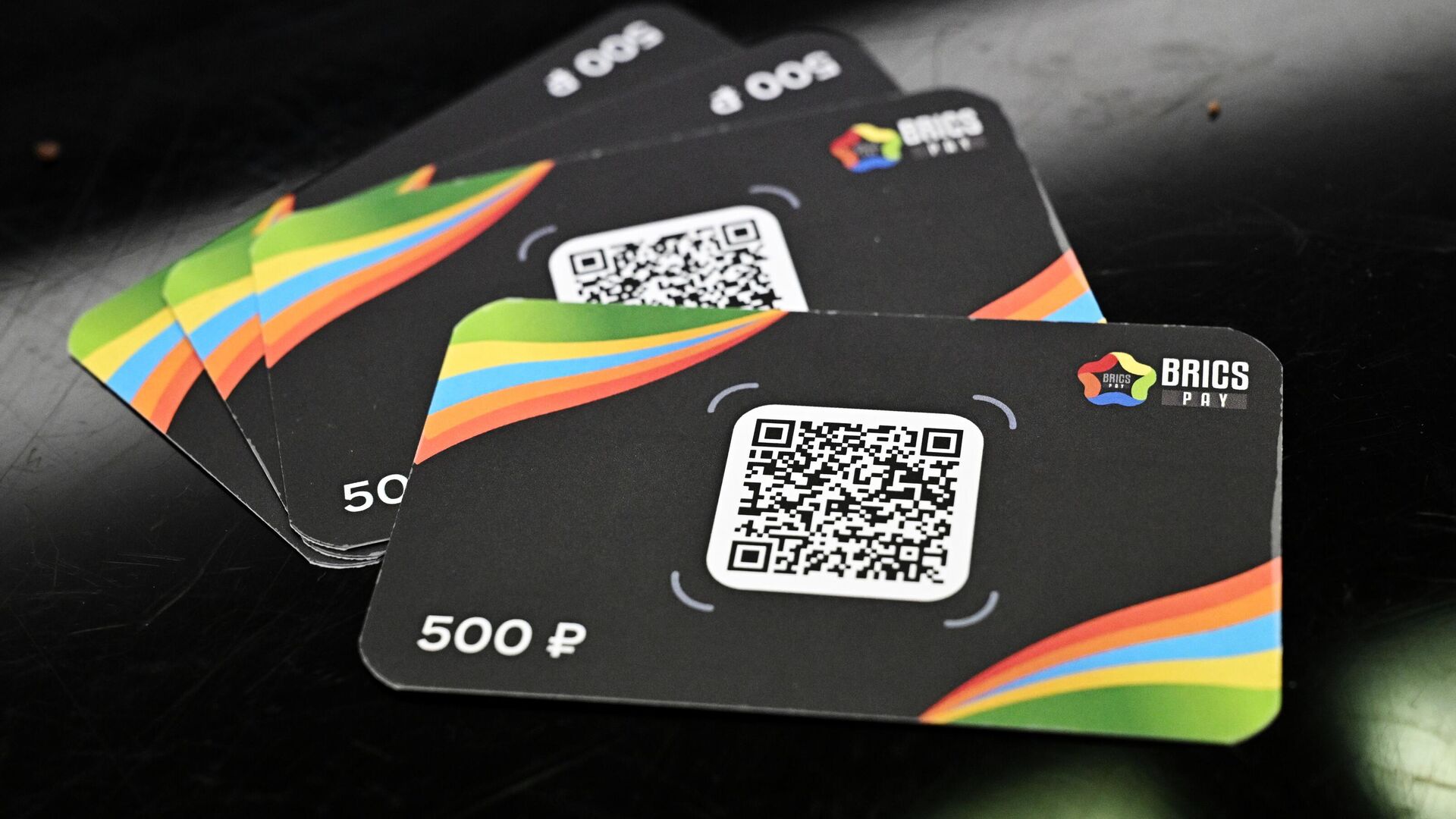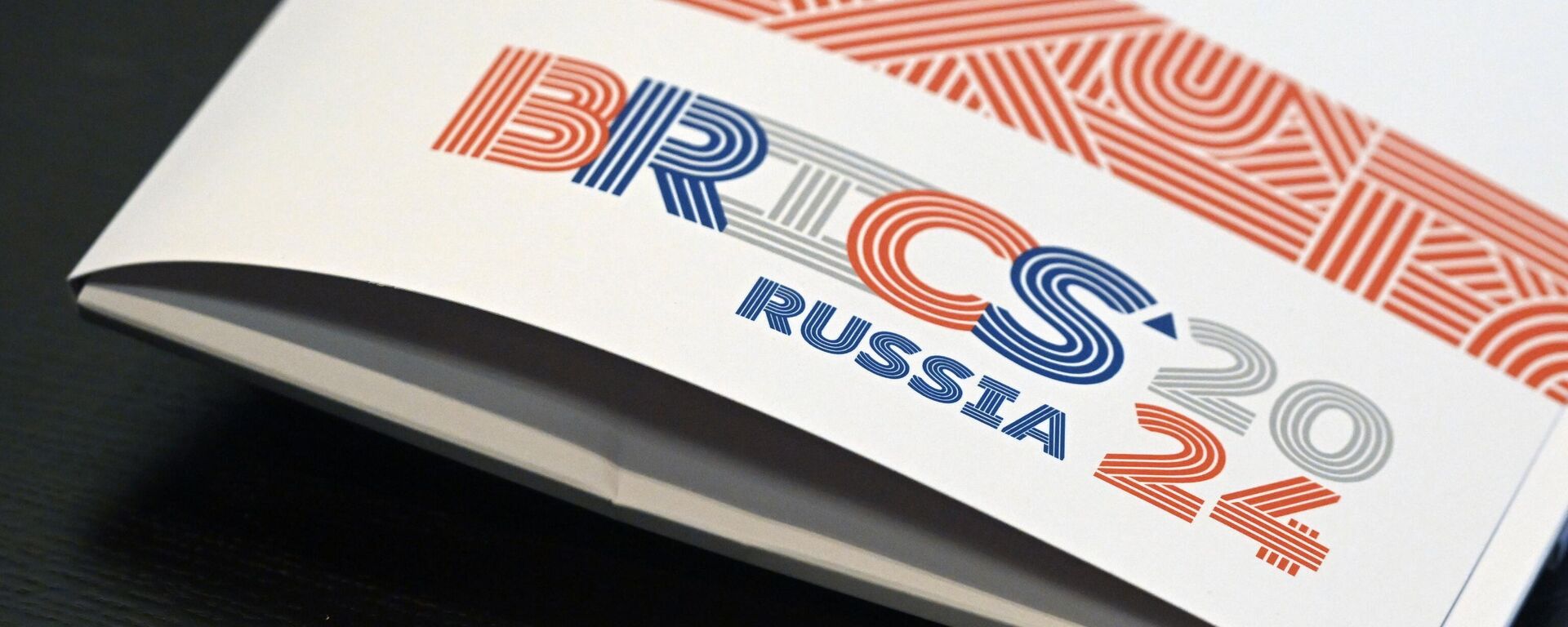https://en.sputniknews.africa/20241023/potential-brics-cross-border-payment-system-could-become-serious-rival-to-swift-1068823768.html
Potential BRICS Cross-Border Payment System Could Become Serious Rival to SWIFT
Potential BRICS Cross-Border Payment System Could Become Serious Rival to SWIFT
Sputnik Africa
MOSCOW (Sputnik) - A BRICS cross-border payment system could eventually replace the existing methods of trade settlements between group members and would... 23.10.2024, Sputnik Africa
2024-10-23T09:41+0200
2024-10-23T09:41+0200
2024-10-23T13:19+0200
brics
brics summit 2024
kazan
russia
local currency
currency
alternative currency
new development bank (ndb)
economy
de-dollarization
https://cdn1.img.sputniknews.africa/img/07e8/0a/17/1068824318_0:122:3210:1928_1920x0_80_0_0_0c4f085e7d1e39c046da628399c9dd8f.jpg
During Russia’s BRICS chairmanship this year, a proposal was made to create a new cross-border payment infrastructure for the members, based on cutting-edge technologies. According to a report presented by Russian Finance Minister Anton Siluanov earlier this month, a multinational payment mechanism — dubbed the BRICS Cross-Border Payment Initiative — could facilitate cross-border payments between BRICS nations, increase the share of national currencies in cross-border settlements and establish interoperability of the group members’ national payment infrastructures. Warwick Powell, adjunct professor at the Queensland University of Technology in Australia, noted the existence of a number of national currency-based trade settlements, supported by recently emerged institutions like regular currency swap agreements. In addition, there are already alternative inter-bank messaging and payment systems, such as China’s Cross-Border Interbank Payment System and Russia’s System for Transfer of Financial Messages. BRICS Currency As the group continues to pursue the strategy of de-dollarization, there have been suggestions regarding the creation of a new form of currency for transactions between the BRICS members. In 2023, State Duma Deputy Chairman Alexander Babakov said that the transition to settlements in national currencies is the first step that is to be followed by the circulation of digital or any other type of new currency in the near future. The lawmaker did not rule out the possibility of a single currency emerging in BRICS, suggesting that it could be secured not just by gold, but also by other groups of products, rare-earth elements or soil. However, last week Russian President Vladimir Putin said that the creation of a BRICS national currency is not being considered at the moment, although Russia wants to offer its BRICS partners the use of digital currencies in investment processes for the benefit of other developing economies. He observed that the issues that have plagued the post-WWII financial systems are caused by the dominance of a single currency over others, which undermines the national currency sovereignty and introduces various risks and costs. Tangen also thinks there will be no single currency that will replace the US dollar, and the real issue is how to create a secure and impartial alternative that is accepted by participating central banks. The expert continued by saying that there are many ways to approach this issue, noting that currently Russia seems to favor something similar to the second solution of those outlined above. However, the matter of convertibility would remain unless exports and imports between participating countries are evened out. BRICS is an intergovernmental association created in 2006. Russia assumed the rotating presidency of the bloc on January 1, 2024. The year began with the accession of new members to the association. In addition to Russia, Brazil, India, China and South Africa, it now includes Egypt, Ethiopia, Iran, the United Arab Emirates and Saudi Arabia, according to the website of the Russian 2024 BRICS Chairmanship. Saudi Arabia has not reportedly formalized its participation but has been taking part in BRICS meetings. The annual top-level BRICS Summit will be held in the city of Kazan in Russia's Republic of Tatarstan from October 22-24.
https://en.sputniknews.africa/20241022/brics-national-currency-settlements-help-build-up-to-single-currency-s-african-official-1068803942.html
kazan
russia
Sputnik Africa
feedback@sputniknews.com
+74956456601
MIA „Rossiya Segodnya“
2024
Sputnik Africa
feedback@sputniknews.com
+74956456601
MIA „Rossiya Segodnya“
News
en_EN
Sputnik Africa
feedback@sputniknews.com
+74956456601
MIA „Rossiya Segodnya“
Sputnik Africa
feedback@sputniknews.com
+74956456601
MIA „Rossiya Segodnya“
brics, brics summit 2024, kazan, russia, local currency, currency, alternative currency, new development bank (ndb), economy, de-dollarization, us dollar, vladimir putin, trade, swift
brics, brics summit 2024, kazan, russia, local currency, currency, alternative currency, new development bank (ndb), economy, de-dollarization, us dollar, vladimir putin, trade, swift
Potential BRICS Cross-Border Payment System Could Become Serious Rival to SWIFT
09:41 23.10.2024 (Updated: 13:19 23.10.2024) Longread
MOSCOW (Sputnik) - A BRICS cross-border payment system could eventually replace the existing methods of trade settlements between group members and would become a serious alternative to SWIFT, if implemented, experts told Sputnik.
During Russia’s BRICS chairmanship this year, a proposal was made to create a new cross-border payment infrastructure for the members, based on cutting-edge technologies. According to a report presented by Russian Finance Minister
Anton Siluanov earlier this month, a multinational payment mechanism — dubbed the BRICS Cross-Border Payment Initiative — could facilitate cross-border payments between BRICS nations, increase the share of national currencies in cross-border settlements and establish interoperability of the group members’ national payment infrastructures.
"If implemented, it would be a major alternative to SWIFT, and the end of US dollar hegemony. If created, there would be a massive panic reaction by developed countries who are wedded to the dollar that could actually work in the BRICS Bank's favor," Einar Tangen, senior Fellow at the Beijing-based Taihe Institute, said.
Warwick Powell, adjunct professor at the Queensland University of Technology in Australia, noted the existence of a number of national currency-based trade settlements, supported by recently emerged institutions like regular currency swap agreements. In addition, there are already alternative inter-bank messaging and payment systems, such as China’s Cross-Border Interbank Payment System and Russia’s System for Transfer of Financial Messages.
"In other words, this currency multipolarity fabric is already operational to varying extents across the BRICS states ... A BRICS payment system adds to the existing currency multipolarity fabric, with the potential over time of replacing this patchwork quilt. In doing so, such a payment system is likely to be more efficient [and] with lower transaction costs. In this context, BRICS can take its time to ensure consensus across its member states, knowing that a national currency-enabled cross border trading world is already in operation," Powell said.
As the group continues to pursue the strategy of de-dollarization, there have been suggestions regarding the creation of a new form of currency for transactions between the
BRICS members. In 2023, State Duma Deputy Chairman Alexander Babakov said that the transition to settlements in national currencies is the first step that is to be followed by the circulation of digital or any other type of new currency in the near future. The lawmaker did not rule out the possibility of a single currency emerging in BRICS, suggesting that it could be secured not just by gold, but also by other groups of products, rare-earth elements or soil.
However, last week Russian President Vladimir Putin said that the creation of a BRICS national currency is not being considered at the moment, although
Russia wants to offer its BRICS partners the use of digital currencies in investment processes for the benefit of other developing economies.
"BRICS members value their sovereignty; the ability to maintain sovereign control over the issuance of the principal means of payment and unit of account operable within their respective jurisdictions is key to national economic sovereignty. The lessons of the EU and the Euro are a stark reminder of how a single currency environment involving divergent economic structures can create large problems and impose costs on the poorer countries. This is not something that BRICS wants to repeat," Powell explained.
He observed that the issues that have plagued the post-WWII financial systems are caused by the dominance of a single currency over others, which undermines the national currency sovereignty and introduces various risks and costs.
"Risks are well-known, but have been exacerbated in recent years by the weaponization of the USD system. Costs are also well-known: transaction fees are exorbitant and time delays in payment settlements are chronically inefficient," Powell said.
Tangen also thinks there will be no single currency that will replace the
US dollar, and the real issue is how to create a secure and impartial alternative that is accepted by participating central banks.
"One major obstacle is how to establish a reference value for currency exchanges. Gold would be one alternative, a market-based approach using the dollar as peg value for transactions, or a fiat-issued BRICS Bank trade credit backed by a basket of currencies of the participating central banks. The amount contributed could be set in proportion to the international trade conducted by each participating country," the expert said.
The expert continued by saying that there are many ways to approach this issue, noting that currently Russia seems to favor something similar to the second solution of those outlined above. However, the matter of convertibility would remain unless exports and imports between participating countries are evened out.
"If a fiat based contribution system is chosen, it would probably use a distributed ledger system held by the contributing central banks, ensuring a degree of impartiality. Creating a clearing system would also involve some technical issues, but the basket could have a formula based dynamic weighting system to create a transaction value. In some respects resembling a crypto coin, except no anonymity, backed by the value of the currencies in the basket," Tangen said, adding that "the advantage is that the BRICS Bank would then have a role as a lender to member countries to deal with currency fluctuations and development depending on the agreement of the members."
BRICS is an intergovernmental association created in 2006. Russia assumed the rotating presidency of the bloc on January 1, 2024. The year began with the accession of new members to the association. In addition to Russia, Brazil, India, China and South Africa, it now includes Egypt, Ethiopia, Iran, the United Arab Emirates and Saudi Arabia, according to the website of the Russian 2024 BRICS Chairmanship. Saudi Arabia has not reportedly formalized its participation but has been taking part in BRICS meetings.
The annual top-level
BRICS Summit will be held in the city of Kazan in Russia's Republic of Tatarstan from October 22-24.


